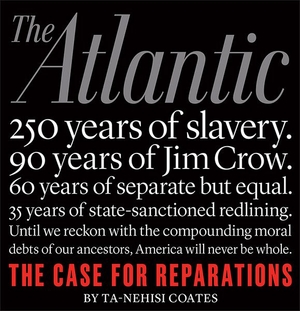Senior Capstone Projects
Reparations for a National Reckoning
Adelina Harvey '20
Reason(s) why you became a Peace and Justice minor: I became a Peace and Justice minor after becoming involved with the Peace and Justice Studies club and CCSJ my first year. I chose to pursue the minor because I was interested in studying the topics from a diverse range of perspectives and disciplines and I wanted to prepare myself for a career that would allow me to strategically address social injustice.
Focus of your capstone project and how you became interested in it: The focus of my capstone project was reparations for African Americans in the United States. My project explores racial injustice in the U.S. and how it has accumulated and been compounded over time as privilege and inequality is passed down through generations due to our failure to address the harm inflicted on African Americans by the institution of slavery. I argue that white Americans have a collective responsibility to repair that harm through a national reparations program that would build peace and promote justice by facilitating reconciliation and a national reckoning by encouraging the entire country to critically analyze our collective history and how it impacts our present. I became interested in this topic my junior year after reading “The Case for Reparations” by Ta-Nehisi Coates for two of my Peace and Justice classes. After reading Coates’ article and studying reparations programs in other countries, I became interested in critically analyzing our own country and the unrepaired injuries that have contributed to injustice and lack of peace for centuries.
Relevance to current events: My capstone is relevant to current events because as white people are becoming more
aware of racial injustice in our country and involved in activism against it, it is important to consider the historical
roots of that injustice, how it has accumulated over time, and our collective responsibility
to repair the harm it has caused.
country and involved in activism against it, it is important to consider the historical
roots of that injustice, how it has accumulated over time, and our collective responsibility
to repair the harm it has caused.
Future plans: I will be starting graduate school at Boston College this fall to pursue my Master of Social Work (MSW) degree with a focus in Macro Social Work and a certificate in Policy and Community Organizing.
To learn more about the history of racial injustice in America and the case for reparations, check out the resources below:
The Case for Reparations by Ta-Nehisi Coates
The New York Times 1619 Project
The Roman Conceptualization of Peace through Tradition and Order: Significance of Ancient History for Contemporary Peace Studies
Hannah Lee '20
Reason(s) why you became a Peace and Justice minor -- I became a Peace and Justice Studies minor because I have always had a love for community service and justice, yet I was never able to dive deeper into what peace and justice really meant in and to my community, country, and the world. I chose this minor so I can complement my dedication to serving others with a deeper understanding of what is behind the injustice that we see today and in history. More specifically, my major (History) paired well with this minor. My major/minor interdisciplinary combination allowed me to study peace and justice (as well as war and injustice) throughout Ancient Roman, Latin American, and East Asian histories.
Focus of your capstone project and how you became interested in it -- My capstone highlights the Ancient Roman conceptualization of peace and how this perception can benefit contemporary peace studies. I argue that the emphasized importance of tradition and order in Roman society/culture also contributed to how Romans perceived peace. Peace then was understood very differently from how it is today and it was not always strictly referred to as "peace" in ancient texts. This is because Roman peace was achieved and defined by when tradition and order were maintained. The structural framework of this understanding is organized both vertically and horizontally, offering a holistic image of peace in the ancient world. Vertically, Roman society was rigidly hierarchical to preserve order. Horizontally, all Romans stressed the importance of tradition in their lives--tradition connected all Romans, no matter their social class. The holistic organization of this framework, I argue, can benefit contemporary peace studies. I became interested in my capstone topic due to the several Ancient Roman history classes I have taken and my fascination with Ancient Rome. More importantly, I wanted to wrap up my time at Loyola by integrating my major and minor.
Relevance to current events -- My topic is not necessarily relevant to current events. However, by taking a more historical approach to my capstone, I argued that analyzing history--in particular, antiquity--can greatly benefit the field of peace studies today. We can learn from history, especially the history we often overlook and/or underappreciate.
Future plans -- In September, I will be moving to Minneapolis to work with Habitat for Humanity under AmeriCorps as a Construction Volunteer Facilitator. Since 2013, I have volunteered for similar construction service work through Appalachia Service Project (ASP), so I look forward to continuing such work. I hope to use my year with AmeriCorps to reflect on what I want to do as a career. Currently, I plan to pursue a master's degree in Criminal Justice to work for criminal justice reform in some way, shape, or form.
Contact Us
Heidi ShakerAssociate Professor of French
Director, Office of Peace and Justice
Maryland Hall 351-I
hsbrown@loyola.edu